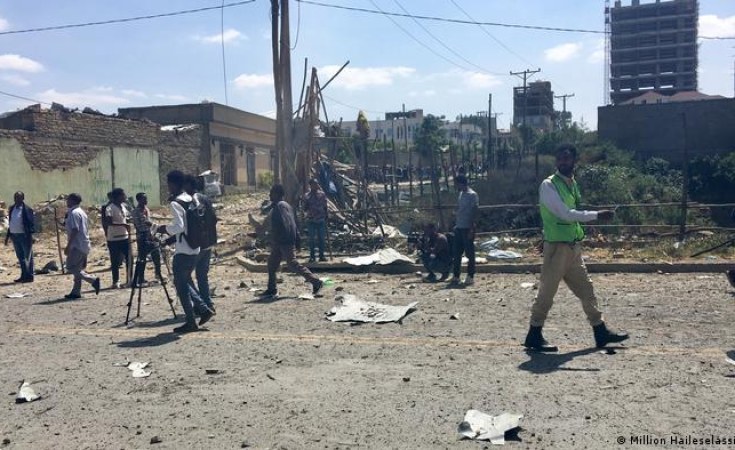Washington — U.S. Secretary of State Antony Blinken met with Ethiopian Prime Minister Abiy Ahmed, as well as other government officials and civil society leaders, in Addis Ababa, Ethiopia, during the first stop of his visit to the African continent.
Speaking at a press conference held at Addis Ababa University on Wednesday, Blinken highlighted the importance of democracy and human rights in Ethiopia, noting the United States is committed to promoting human rights and the rule of law in Ethiopia.
Blinken also took a moment to reflect on the lives lost and the pain many endured in the two-year-long war that began in late 2020 and ended with a cease-fire brokered in November.
"The conflict was absolutely devastating," Blinken said. "Hundreds of thousands killed. Widespread sexual violence against women. Millions forced to flee their homes. Many left in need of food and shelter, medicine. Hospitals, schools, and businesses were shelled and destroyed."
He commended the peace effort that has taken root in the country, with the help of mediators from the African Union, Kenya and South Africa, and supported by the United States.
"The Cessation of Hostilities Agreement is a major achievement and step forward, saving lives and changing lives. The guns are silent," he said.
Blinken praised the Ethiopian government and Tigrayan leadership for the cessation of hostilities. And he brought some good news, saying that the U.S., already the biggest bilateral donor to Ethiopia, will add to that total.
"Today I announced an additional $331 million in emergency food and humanitarian assistance that will reach billions of people, millions of Ethiopians affected by conflict, affected by drought."
Joseph Siegle, director of research at the Africa Center for Strategic Studies said that the U.S. "has a very critical role to play as a trusted actor, as a guarantor," in the ongoing peace process.
The U.S., he said, can make sure the process is balanced by speaking up for Tigrayan interests while still ensuring "that Ethiopian sovereignty and Ethiopian interests are also being respected."
Although the cease-fire is an opportunity to pursue justice and hold those responsible for atrocities accountable, Siegle said that it is not a simple process.
"It's complicated because there are many actors involved in this conflict and atrocities were committed on all sides including from the Tigrayan side, the Eritreans who were involved as well," he told VOA. And although it might not be easy to get "accountability to the full extent that human rights advocates might want," he added, "there is room for considerable progress on that front."
Blinken said that with peace taking hold, Ethiopia is moving in the right direction, and the U.S. shares its aspirations, but is not yet ready to welcome it back into the U.S. trade program known as the African Growth and Opportunity Act (AGOA). AGOA, a preferential trade agreement, allows some African businesses duty-free access to U.S. markets. Ethiopia was removed from AGOA at the beginning of 2022.
Siegle said that it is not practical to expect an immediate return to normal for the Ethiopia-U.S. relationship. However, there is "a sincere interest on both sides to resume a full-fledged robust relationship," he said.
"There's great interest on both sides to restart economic engagement, to open up trading opportunities, including the AGOA [the African Growth and Opportunity Act] accreditation, that was put on hold for Ethiopia. Ethipia needs considerable investment and trade to help rebuild, following the devastating conflict, and Ethiopia is a very important country in the Horn of Africa, in Africa more generally. It's one of the strongest partners the United States has in Africa. And so, I think the U.S. also wants to get things back onto a more normal footing."
But human rights advocates say not enough has been done by the Ethiopian leadership in terms of making amends for war crimes and allowing investigators to document atrocities. Sarah Yager is the Washington director at Human Rights Watch, a New York-based advocacy group. She said Ethiopian Prime Minister Abiy Ahmed simply wants to move on from the war without accepting any blame.
"What he has been doing is downplaying the atrocities that have occurred by all warring parties, but also his own, by his own direction in places like Tigray," Yager said. "He is looking to get economic relief from the United States. He is looking to get other partners around the world interested in being donor nations, in having free trade and bringing businesses back to Ethiopia."


